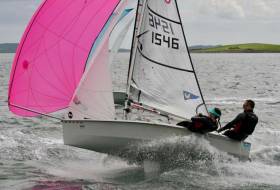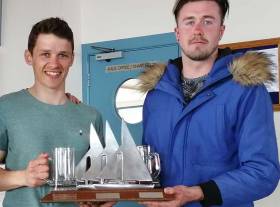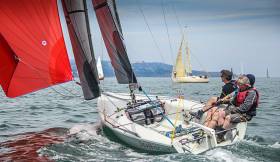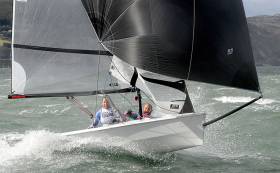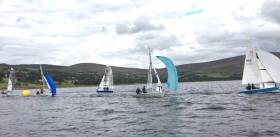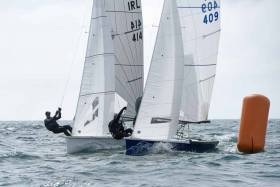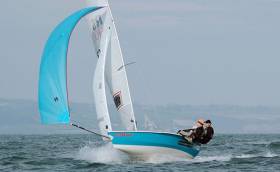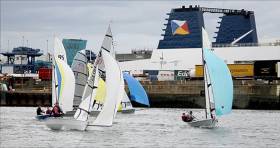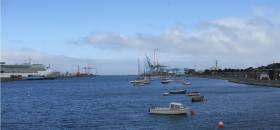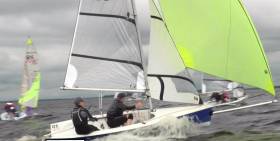Displaying items by tag: RS200
Strangford Lough is often accurately described as a ‘hidden gem’ writes John McKelvie. While only 30 minutes from Belfast, as you pass the rolling fields and gastropubs of Killinchy, you really aren’t sure what to expect - until you see it from the crest of a hill. 58 square miles of sea lough, over 300 islands, and a comfortable white clubhouse sitting in a bay jammed full of racing and cruising yachts.
26 RS200 teams made the journey from all over Ireland, Scotland, England, and even Guernsey - special mention to Henrik and Georgina who has now been on every ferry on these islands!
Download full results below
A crack race team under Angela Gilmore had been assembled, the competitors were keyed up, and then… nothing. Not a breath of wind on the first day so a decision to postpone was made Some took the chance to visit the sights around the Lough by RIB, while others found solace in one of the many aforementioned gastropubs. They serve Guinness,… certainly enough to dampen some teams’ performance in MJ Gifford’s brilliant pub quiz that night.
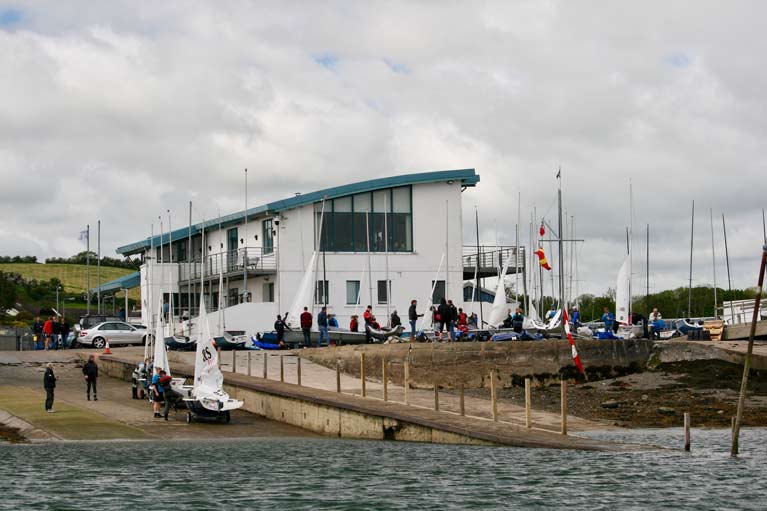 The fleet departs from Strangford Lough Yacht Club Photo: Sarah McKelvie
The fleet departs from Strangford Lough Yacht Club Photo: Sarah McKelvie
Saturday had four races in light and shifty conditions. Sophie Mear and David Jessop in 1659 put the schnell into schnellwurst and probably had the legs on the fleet, but overnight leaders were Alex Sutcliffe and Andy Brown. The fleets then sat down together for the famous three-course SLYC Championship Dinner.
Big Sunday brought a sold 20 knots, gusting 25 and more. The RS400s kindly stayed ashore and let the 2s go play. Only faintly terrifying at times - it felt fast downwind and looked even faster in the photos. Most of the fleet managed to get the centreboards out of the water and boats airborne, and those who stayed upright scored well. Alex and Andy had cemented their lead at the top, followed by Jill and Andy Peters, but the final podium step was where the action was, with Charlotte Cotter and SLYC local John McKelvie in 3rd, closely followed by Sophie Taylor and Brendan Lynch, and the 1659 combo likely still to be in contention when discards kicked in.
Ultimately it all came down the final race. Pre-start, 806 and 1546 circled with John driving Brendan down to the unfavoured end of the line. This continued through the first beat and run, but both boats kept popping out at the front of the fleet! Sophie/David recovered well after a bad first beat, and the three boats finished within touching distance of each other, with job done for 1546 who completed the podium and took the RS Northern Championship. Sophie/David claimed 4th overall with Sophie/Brendan rounding out the top 5.
Congratulations to Alex and Andy who sailed a fantastic series and are well deserved 2019 EuroCup champions. Thanks are due to all the members at SLYC who volunteered to make the event so successful - two favourite quotes were, “I don’t want to go home”, and “can we come back here next year?”
Download results below
The second RS event of season kicked off in 2019 at Strangford Lough YC in Co. Down to host the RS200 Eurocup over four days and RS200/400 Northern championships racing over the weekend. In the 200s this attracted numerous British visitors for racing on Irish shores to make it more interesting and bigger fleets to contend with. It started off a misty morning with not much breeze but shortly after midday it began to clear and the boats all launched. The 400s along with the impressive 200 fleet on the same Windward/Leeward course racing began beside ‘Dead Mans’ rock, hovering over the course with Strangford’s infamous low tide. The first start went off without a hitch highlighting the importance of clean air and matching up the patches of gusts and shifts. The sun also decided to come out to play resulting in one of the warmest days of year! However, On the second lap, the race committee made the call to abandon the race due to wind falling below an acceptable level of 3 knots and a significant wind shift causing an unfair advantage. No favouritism shown to the Strangford local Hammy Baker in his shiny refurbed boat who made a nice gain on the second beat to be in the lead at the time.
Shortly after the wind picked up a bit more and steady enough to race so once some course adjustments made the fleet jostled for position and got away. In this one again McCartin/Penney lead from Baker/Chimney and Team Purdon early on but on second beat Donnelly/McCaig came back into it finishing second in end to McCartin/Penney and first and Penney/Rutherford recovering to 3rd by final downwind. The 2nd race of the day and one general recall later for the 400s the racing got away once allowing bit more even bias to spread boats along line away from the prime position and shiny committee boat of line. The wind had picked up at this stage closer to 10-12knots at times allowing for flat hiking and at-or-close-to planing conditions downwind to make it fun. This start had an individual recall (with the offender making amends going back) and led by the mighty pairing of Stephen McL and Ryan Wilson at the top mark but were caught up by McLaughlin/McKinley and the dynamic duo of Peter Kennedy/Stephen Kane on the downwinds. By the second lap McLaughlin/McKinley got the win with Kennedy/Kane in 2nd surviving a late charge from McCartin/Penney in 3rd. The introduction of dark clouds and an ever-increasing flooding tide meant that big gains were made on boats committing to one side of the course so consistency was proving difficult.
There was no hanging about for the last race of the day with another busy committee end start. The leaders where mixed throughout the race with a big split on first downwind causing the fleet to almost reverse in order at one point but showing great skills McLaughlin/McKinley were once again in lead taking initiative to gybe off to better wind side to build an extending lead with O'Sullivan/McGlade in 2nd and Purdon/Purdon 3rd. On second lap the fleet got tighter once more with plenty place changes last downwind. McLaughlin/McKinley stayed ahead and Purdon/Purdon who got through to second on the last gybe to finish suddenly felt their rudder go right at finish which was very unfortunate. Penney/Rutherford came 3rd. The fleet retired a shore to a great social in the club and catering set up for a championship dinner as part of entry keeping everyone around which was great with music and good fun into the night as the fleets relaxed.
Day 2 woke up to the opposite scale of conditions and with high gusts coming through in the higher 20's region, the decision was made to race one fleet at a time on the course to minimise fleet overlap and potential collisions on a shorter Windward/Leeward course and also to ensure enough rescue cover. The 200s went first to the gaze of 400s from balcony as the sharp gusts caused a few early capsizes and breakages among many top boats retiring many of the fleet early. From this, the decision was made to call-off the 400s from further racing meaning results from Day 1 stood. This meant Barry McCartin/Andrew Penney won ahead of Paul McLaughlin/Owen McKinley and Chris Penney/Jess Rutherford finishing 3rd.
A final thanks here should be left to John McKelvie, the Club committee, Race team, marks, and the (busy) rescue/beach teams that made the event run so smoothly and professionally on all sides. Also, in particular, thank you to all the competitors who made the effort to travel and enjoy the lesser known spoils and toils of Strangford Lough! Many more events on the RS circuit to come with RS Inlands in Blessington 27/28July, RS Westerns in Galway 10/11 Aug, the biggest event of year RS400 UK/Irish Nationals in Royal North 25-29Aug and final one RS Southerns/Dinghyfest in Cork 14/15 Sept.
Irish National Sailing Club's 'Super Series' Adds SB20s to Dun Laoghaire Winter Series
The Irish National Sailing Club Super Series is expanding this year and as well as racing for RS200/400s, the Dun Laoghaire Harbour based winter series will also include racing for SB20 sportsboats.
With a 10am first gun, the aim is to do as many sprint style racing races as possible (max 5) and off the water by 1pm.
The schedule will be five race Saturdays over the winter from November 11th. And then on December 16th, January 13th, February 10th and March 10th.
There will be simple windward–leeward courses with a leeward gate and spreader at top with a start/finish line at the bottom of the beat.
The cost is €50 to enter the series per boat either SB20 or RS200/400.
Check out the 2016/17 RS Super Series video below for a flavour of the action...
Enter here
RS400s & RS200s In Action at Greystones Sailing Club
The RS400 and RS200 fleets gathered at Greystones Sailing Club in County Wicklow last weekend for their National and Southern Championships respectively writes David Rose.
The Irish RS fleets, like Greystones harbour itself, have continued to evolve and renew with the times. Both are in rude health. Some of the first RS400’s in Ireland sailed here and the club honour board has a dedicated section to the GSC members who have been club and national champions of the past. Son of GSC Sean Cleary won the southern championship event the last time the RS400 show was in town, and his family were involved again this year, with Conor Clery pairing up with Katie Noonan in a 400. Sean still sails a RS400 in the UK where he has settled, hopefully just for now. The RS400 has been a national fleet for a few years now, with strongholds in Cork, Northern Ireland, Dublin Bay and many other locations including GSC. 2017 has been a strong year and 30 of the best boats on the island descended on the town well prepared for the national championship battle.
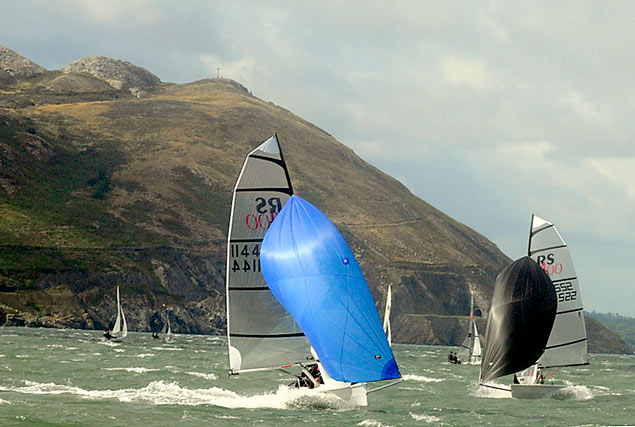 Full speed under Bray Head for RS400 dinghies on the Greystones Sailing Club race track. Photo: Alan Leddy
Full speed under Bray Head for RS400 dinghies on the Greystones Sailing Club race track. Photo: Alan Leddy
Tom Rusbridge, our race officer, who flew in from West Sussex for the event and his team provided great courses and went about their job with minimum delays between races and notably few recalls required. They really did not put a foot wrong in difficult conditions, including 70 degree wind shifts in races two and four of the 400 event. Saturday was very exciting and the wind added to the tidal theatre with gusts regularly over 30knots. Legend has it that one yacht clocked 38 knots, but we only have picture evidence of 33 knots from the committee boat. The committee looked as though they were competing hard with the conditions themselves. The final day of our events had to be called off due to a very grim forecast. The PRO felt that it was not worth risking people’s safety and the majority of competitors agreed. These are high performance dinghies and while they are wonderful fun in breeze, they do provide a challenge to rescue cover and crews on very windy days. The event was to provide plenty of drama, with massive wind shifts on day one and a tidal race that caught more than a few people out on lay lines and rounding’s. The locals explaining shore side that the tide generally goes south here, unlike everywhere else on the east coast where the tide will go out to the south and in the north.
Gareth Flannigan and David Fletcher arrived battle hardened from the recent Laser Masters event in which Gareth took gold and David a very respectable 7th. The team have always competed for RS silverware and this event was no different, with a superb opening day carding a 3, 1, 3, 2, putting them in second overnight by a point to Alex Barry and Grattan Roberts who also had one bullet day one but followed it up with two seconds. Our welcome English visitors Jon Willars and Richard Brameld having won the opening race lay in third also carding two 4ths. David Rose and Ian Hef had won race three, but were off the pace in the other races and lay in 7th overnight. Locals Peter Bayly and Paddy Blackley had carded a very solid 6, 3, 11, 6 and were sitting in 5th behind Emmet and James Ryan from RstGYC. John Downey and Sandy Rimmington had an unspectacular day but remained in contention with a 5, 5, 7, 7.
Grattan Roberts was drafted in by Alex Barry for this year’s RS400 nationals, and he had very big boots to fill. Some sports people just thrive in situations like that, and at 19 Grattan has very little to prove having already won the National 18 National championships with Charles Dwyer in Cork this year. Grattan’s father of the same name is a cork sailing legend was the helm of the swan 65 Desperado. Grattan sails everything going, having grown up with the 420 academy scene. Last year he sailed the RS400 with Johnny Durcan carding a 5th place overall. He is a regular 1720 sailor and often sails on Cork’s Anchor Challenge in the Quarter Ton Scene. Grattan is an Irish sailor who we can expect to be reading about for many years to come.
John Downey and Sandy Rimmington approached the windy Saturday with a swagger that was lacking in much of the fleet. Sporting these new Rasher Rasher’s, they proved sublime on the day carding all results lower than day one. Their impressive 3,1,3,1 results had them breathing down the neck of Gareth Flannigan and David Fletcher who took second overall on 21 points to John and Sandy’s 25. Gareth and David have always been superb in the breeze and they carded 10, 4, 4, 4 which was solid on a day where most struggled. So to our national champions, Alex Barry and Grattan Roberts, who continued on day two where they left off on day one with an absolutely dominant 1,2,1,2. That was making it three bullets and three seconds in the series to card a stunning 11 points and overall victory. Alex and Grattan had a habit of recovering quickly whenever they found themselves in the pack, a sign of great champions. This is officially Alex’s second RS400 title, having been best Irish boat once before also and recorded a second another year. So Alex is 1, 2, 2, 1 for national titles since joining the class, and has firmly established himself as legend.
A special thank you to Australians Paul and Bronwyn Ridgeway from Melbourne who made it to the northern hemisphere just to race RS400’s and to our English visitors Jon Willars and Richard Brameld who were fifth and Ben Williamson and Ed Wheldon who were tenth.
The RS200 Class has had a fantastic year, and the fleet numbers are up in almost every event. They had their national championships in Cork earlier in the season, where the fleet has taken hold. As I mentioned earlier the second day of the event had to be called off due to a very bad forecast, however the fleet competed hard for honours on Saturday and there was something of a passing of the baton from Marty O’ Leary and Rachel Williamson bowing out of the class gracefully out of the results. They have been a very dominant pair over the last few years and no doubt will be missed. Frank and son Kevin O’Rourke sailing out of their native GSC stepped up and dominated with a whitewash. Followed by RCYC’s Katie and brother Jamie Tingle who recorded a 2, 4, 2. RCYC took third also with Cian Jones and Jonathan Sargeant. There were 18 200’s and lots of new faces, the future is very bright for this class.
Download results below.
RS200, RS400 & RS Feva Fleets Gather at Blessington Sailing Club for Inland Championships
Over RS Sailing 40 crews arrived at Blessington Sailing Club to the clubs usual very friendly hospitality to join the newly established local fleet of RS200’s writes Kevin Brazel. Download full results below.
With a 1300 first gun on Saturday morning and a forecast for dying breeze, race officer Robin Gray from Ballyholme was eager to get things off in his ever efficient way.
The standard windward leeward course with a gate was set in a typical shifty lake breeze. The RS400 fleet was sent off first but a major shift before the first top mark caused the race to be abandoned. At the second time of asking, Trevor D’Arcy and crew Alan McLemon came out on top in Race one.
A testament to the tight racing enjoyed by the RS400 fleet was the fact that there was a different winner in each race. Rob Hastings and crew Lawrence from the Royal North took race two. Monkstown’s Robbie O’Sullivan and Phil McFountain won race three. With the most consistent top results and a win in race 4 Paul McMahon & Simon Martin from Howth took the title of RS400 2017 inland champions
In the RS200 fleet Marty O’Leary and Rachel Williamson showed more of the speed they’ve had all season. The only blot on a their score card was an OCS in race 4 when Marty was a little premature, much to the annoyance of Rachel. Emmet Ryan and Kevin Brazel, who were making the change in “weight division” to the 200 for the weekend took second place with Greystone’s Frank O’Rourke with Diana Kissane in third.
The youth class, the RS Feva turned out to be a very competitive fleet, with the winner, Royal St. George’s Marcus O’Leary showing consistency is key. Not winning a race but being always in the front 3 to take the overall win. Second was Max and Georgia Goodbody from the Royal Irish, and third was Alan Leddy crewed by Greg Houlihan from Greystones.
Once on shore the Blessington members put on a great show, with a michelin-star barbeque on the beach, cheap beer and music until late to keep the many sailors staying around the club entertained, the best apres-sail anyone in the fleet can remember of the last few years!
Thanks to Blessington for running an absolutely brilliant event, with incredible food and real hospitality. Big thanks to Robin for doing a perfect job on the committee boat, managing to get four races off in very difficult conditions.
Next up are the RS400 Nationals and RS200 Southerns in Greystones on the 8th ,9th and 10th of September.
No sooner has Howth Yacht Club completed its Spring Warmer Series for keelboats than it is preparing for its first dinghy event of the 2017 Summer season. HYC will host the RS Eastern Championship over the 22nd April and 23rd April.
The RS classes will be joined by Cork Harbour's travelling National 18s and the SB20 sportsboat class.
In the run up to the championships, the RS Feva class are staging a two day training session in Howth. Training is open to all sailors around the country regardless of ability. 20 boats are expected for the Easterns and there is a lot of renewed interest in the class now from Optimist sailors looking to try a two hander.
An early bird entry discount has been extended until tomorrow (April 12), according to HYC's Ross MacDonald. Enter here.
With only three days to go, excitement is building for the 2016 RS200 & RS400 Irish National Championships in Schull, West Cork. The event, hosted by the Fastnet Marine Outdoor Education Centre will see a fleet of 40 RS400s and 20 RS200s race across two courses under Race Officers David Harte and Alan Crosbie.
Racing will be outside the harbour, south of Long Island, a venue often underutilised but which offers amazing scenery, big waves and clear winds.
RS 'King Of The Liffey' Success At Poolbeg Yacht & Boat Club
Saturday 13th of August saw Poolbeg Yacht & Boat Club hosted its first ever dinghy event as the RS200’s and RS400’s competed for “The King of the Liffey” title which was run as part of the club’s annual Regatta.
With a cruise ship occupying the course racing was postponed for one hour. Competitors gladly took the opportunity to enjoy the hospitality and breakfast rolls laid on by the members and staff at Poolbeg, which more than lived up to its welcoming reputation.
Once the large obstacle had departed, PRO Barry O’Neil and his team wasted no time in getting racing under way. The race officer’s briefing emphasized the aim of the event was to pack as many high quality but fun races into the allowable time and he duly delivered on all fronts. The ten knot Westerly breeze allowed for a perfect windward leeward course to be set. The start line located directly in front of the club house was the ideal spectator vantage point to view the action as boats had a beat towards the East Link toll bridge and barrelled their way back downwind to the leeward gate. There was also plenty of head turning from the passing traffic that paralleled the race course only meters from the water.
Given the tight nature of venue crews had to decide, which side of the river to play upwind. Some beats it appeared to favour going as close as helms dared to the North Wall while other times it paid to tack along the Poolbeg marina and take a chance by dodging into the forest of moorings and club boats on the South side of the river, all of which added to the excitement.
As the day went on the number of spectators grew as the Poolbeg Regatta cruiser racer fleet which include a newly adopted class of six Ruffians returned ashore. The cruisers raced in two classes, with smaller boats competing in a round the cans race on Dublin Bay and the larger yachts enjoying a costal “Three island race”, which took in Dalkey Island, The Muglins and Ireland’s Eye.
After nine races for each of the RS classes and the small matter of another sizeable ship on its way up the river, the fun was over on the water at least. With multiple race winners in each class everyone was left guessing how the final scores would tally up. The competitors had lost count long before the finish.
In RS200’s Neil and Maeve Spain had a very impressive day taking six race wins. Aaron Jones and Rebecca Rock had a very solid event to take second. In third place, with a very consistent set of results, were Triona Hinkson and Helen O’Bernie who showed plenty of potential and will definitely be a team to watch in future RS200 events.
In the RS400’s Peter Bayly and Paddy Blakely grew stronger as the nine race series went on and finished with a three point win over Dave Sweeney and John Downey who took second place on count back from Emmet and James Ryan.
With boats de-rigged crews joined in with the Regatta festivities in the Poolbeg club house just in time to cheer on fellow RS400 sailors Ryan Seaton and Matt McGovern as they did all proud in Rio. The evening’s entertainment followed a distinctly Rio theme, with an authentic Brazilian Samba Band complete with Dublin Ports first man-made beach installed at the club for the occasion.
A huge thank you to everyone at Poolbeg Yacht & Boat Club from all the RS teams and to Dublin Port Company who very generously sponsored the event and facilitated the racing to take place amongst the non-stop shipping operations of the port. The talk amongst the RS sailors was of making this an annual fixture.
Below are selection Youtube Clips of the day’s action.
RS200 RESULTS
Helm Crew Club R1 R2 R3 R4 R5 R6 R7 R8 R9 Total Overall
Neil Spain Maeve Spain Howth YC 2 1 1 1 1 (5) 1 1 2 10 1st
Aaron Jones Rebecca Rock Greystones SC 1 2 2 (4) 3 2 2 4 3 19 2nd
Triona Hinkson Helen O’Bernie Royal St George YC 4 3 4 2 (5) 1 4 3 4 25 3rd
Greg Arrowsmith Toby Hudson Fowler Royal St George 3 5 5 (6) 2 4 5 2 1 27 4th
Jemima Owens Peter Naessens National YC (5) 4 3 3 4 3 3 5 5 30 5th
Emer Raferthy Herbie Fowler Royal St George YC 6 6 6 5 6 6 6 DNF DNS 48 6th
RS400 RESULTS
Helm Crew Club R1 R2 R3 R4 R5 R6 R7 R8 R9 Total Overall
Peter Bayly Paddy Blakely Greystones SC (4) 2 2 1 1 1 3 4 1 15 1st
Dave Sweeney John Downey Bray & Monkstown SC (7) 3 4 3 2 2 1 1 2 18 2nd
Emmet Ryan James Ryan Royal St George YC 1 1 3 (5) 3 3 2 2 3 18 3rd
Sean Cleary Luke Murphy Oxford Sailing Club 3 6 1 7 4 4 (8) 5 5 35 4th
Conor Cleary Luke O’Rourke Greystones SC 5 (8) 5 2 6 7 6 3 6 40 5th
Stephen Craig Conor Foley Royal St George YC 2 4 (8) 6 8 6 4 6 4 40 6th
Kevin Brazel Henry Higgins Dungarvan SC 6 5 7 4 7 5 7 (8) 7 48 7th
John Malone Patrick Whyte Mullingar SC 8 7 6 8 5 8 5 7 (OCS) 54 8th
Poolbeg Yacht Club Host it’s First Ever Dinghy Open Event: RS King of the Liffey Sprint
Poolbeg Yacht and Boat Club hosts it’s first ever dinghy open event as part of their annual regatta. The combined RS fleets, the RS200’s & RS400’s, will race the "King of the Liffey Open Sprint Event" on Saturday the 13th of August. Exciting short course racing will be run on the Liffey opposite the ideal spectator vantage point of Poolbeg Yacht Club. Anyone interested in watching some close racing in the city centre is more than welcome!
RS200s & RS400 Dinghies Have a Blast At Waterways Ireland 2016 RS Inland Championships
The RS Fleet enjoyed a cracking weekend of racing as Lough Ree Yacht Club played host to the Waterways Ireland 2016 RS Inland Championships last weekend. Race Officer John Leech managed to play the shifty conditions better than most competitors and completed a full programme of six races with winds ranging from sub ten knots to mid-twenties for Sunday’s final blast.
As words don’t do the action justice, check out this video below by Shane Goggin.
Day 1 2016 RS Inland Championships RS400 Video:
Results Summary
RS200’s Top 3
1st Marty O’Leary & Rachel Williamson
2nd Neil Spain & Maeve Spain
3rd Aaron Jones & Rebecca Rock
RS400’s Top 3
1st Alex Barry & Richard Leonard
2nd Gareth Flanagan & David Fletcher
3rd Emmet Ryan & James Ryan


























